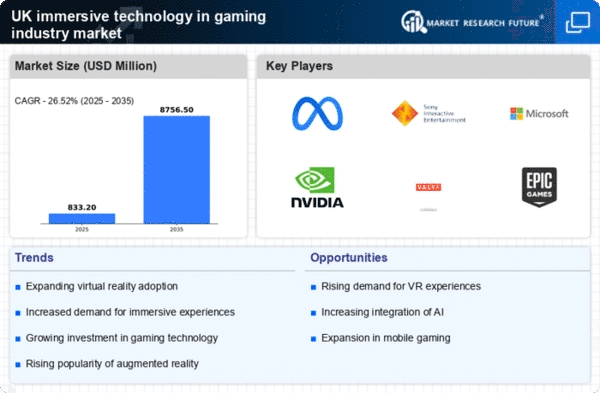The immersive technology-in-gaming-industry market is currently characterized by a dynamic competitive landscape, driven by rapid technological advancements and evolving consumer preferences. Key players such as Meta Platforms (US), Sony Interactive Entertainment (JP), and Microsoft Corporation (US) are at the forefront, each adopting distinct strategies to enhance their market positioning. Meta Platforms (US) continues to focus on innovation in virtual reality (VR) through its Meta Quest series, aiming to create more immersive gaming experiences. Meanwhile, Sony Interactive Entertainment (JP) leverages its strong brand presence and exclusive game titles to maintain a competitive edge, while Microsoft Corporation (US) emphasizes cloud gaming and subscription services to attract a broader audience. Collectively, these strategies contribute to a competitive environment that is increasingly centered around technological innovation and user engagement.
In terms of business tactics, companies are increasingly localizing manufacturing and optimizing supply chains to enhance efficiency and reduce costs. The market structure appears moderately fragmented, with several key players exerting substantial influence. This fragmentation allows for a diverse range of offerings, catering to various consumer segments and preferences. The collective actions of these companies shape a competitive landscape that is both vibrant and challenging, as firms strive to differentiate themselves through unique value propositions.
In October 2025, Meta Platforms (US) announced a partnership with leading game developers to create exclusive VR content for its Meta Quest platform. This strategic move is likely to bolster its content library, enhancing user engagement and potentially increasing market share. By focusing on exclusive offerings, Meta aims to solidify its position as a leader in the immersive gaming space, appealing to both casual and hardcore gamers alike.
In September 2025, Sony Interactive Entertainment (JP) unveiled its latest VR headset, the PlayStation VR2, which features advanced haptic feedback and eye-tracking technology. This launch is significant as it not only showcases Sony's commitment to innovation but also positions the company to compete more effectively against rivals. The integration of cutting-edge technology into its gaming ecosystem may attract a wider audience, thereby enhancing its competitive stance in the market.
In August 2025, Microsoft Corporation (US) expanded its Xbox Game Pass service to include a wider array of VR titles, reflecting its strategy to integrate immersive experiences into its gaming subscription model. This expansion is indicative of a broader trend towards subscription-based gaming, which may reshape consumer expectations and spending habits. By diversifying its offerings, Microsoft is likely to strengthen its market presence and appeal to a growing demographic of gamers seeking varied experiences.
As of November 2025, current competitive trends in the immersive technology-in-gaming-industry market include a pronounced focus on digitalization, sustainability, and the integration of artificial intelligence (AI). Strategic alliances are increasingly shaping the landscape, as companies collaborate to enhance technological capabilities and expand their reach. Looking ahead, competitive differentiation is expected to evolve, with a shift from price-based competition towards innovation, technology, and supply chain reliability. This transition underscores the importance of creating unique, immersive experiences that resonate with consumers, ultimately driving growth in this rapidly evolving market.















Leave a Comment